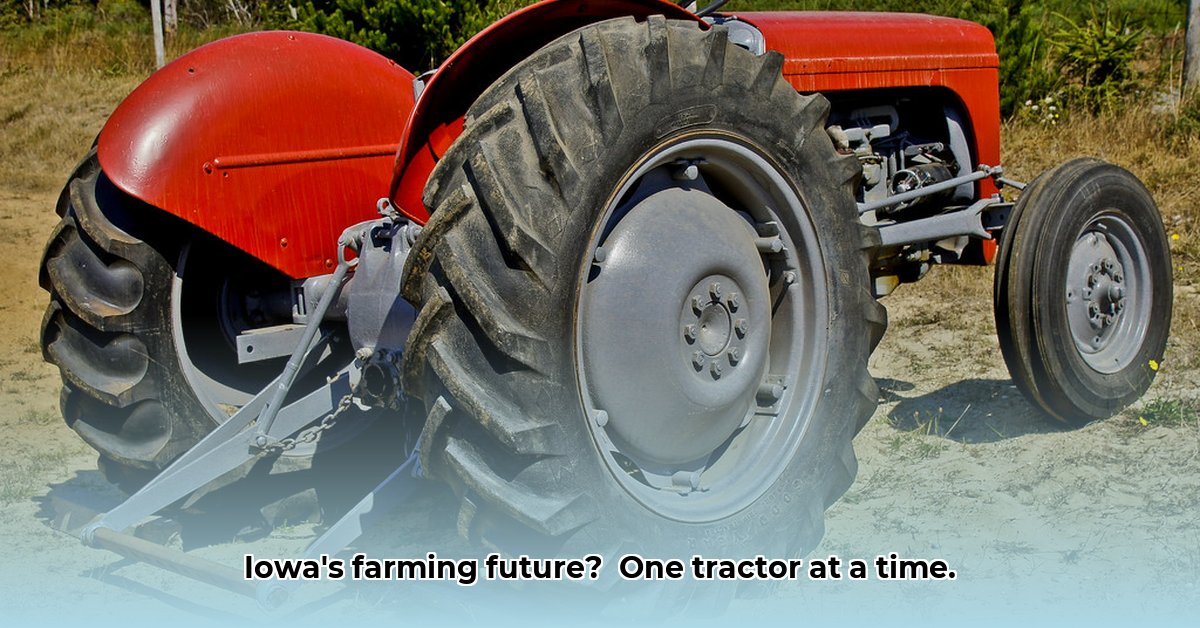
Old Hwy 6 Tractor: A New Chapter in Iowa's Sustainable Farming Future
Lang Diesel Inc. (LDI), a prominent player in Iowa's agricultural equipment sector, has significantly expanded its footprint with the acquisition of Old Highway 6 Tractor and Equipment, a well-established business in Council Bluffs. This strategic move underscores LDI's commitment to sustainable agriculture and its potential to reshape Iowa's farming landscape. The acquisition brings together two companies with a shared vision: providing farmers with the tools and knowledge to adopt environmentally friendly practices. For more on sustainable farming equipment, check out this helpful resource: Sustainable Farming Equipment.
This isn't simply a business transaction; it's an investment in a greener future for Iowa agriculture. LDI's focus on sustainable solutions aligns perfectly with Old Highway 6's established presence and experienced team. The combined entity promises a wider array of services and increased access to sustainable technologies for Iowa farmers.
How will this impact Old Highway 6's employees? LDI has pledged to retain the entire staff, ensuring continuity and preserving the valuable expertise accumulated over years of service. This demonstrates LDI's commitment to a seamless integration, focusing on human capital as a critical asset.
What does this mean for Iowa's farmers? The acquisition translates to enhanced access to advanced, sustainable farming equipment and services. LDI plans to introduce Kubota's renowned line of fuel-efficient and low-emission machinery into Old Highway 6's inventory. This will result in lower operating costs for farmers and a reduced environmental impact. Isn't reduced fuel consumption a significant cost saving? This isn't just about providing equipment; it's about empowering farmers to transition to more sustainable practices.
Sustainable Equipment: More Than Just Tractors
The acquisition extends beyond the provision of tractors. LDI and Old Highway 6 now offer a comprehensive suite of sustainable farming solutions, encompassing electric utility vehicles, precision farming tools, and even biodegradable mulch films. This holistic approach to sustainability enables farmers to minimize their environmental footprint across their entire operation. It's not merely about equipment upgrades; it's about fostering a complete shift towards environmentally responsible farming.
The Road to Sustainable Farming: Practical Steps
The acquisition highlights the growing need for sustainable farming practices. Choosing the right sustainable equipment is a strategic decision dependent on several factors. How can farmers navigate this evolving technological landscape?
- Assess Your Needs: Begin by thoroughly evaluating your farm's unique operational requirements, considering factors such as scale, crop type, and existing infrastructure. This assessment forms the foundation for selecting appropriate equipment.
- Explore Options: Research and compare various sustainable equipment options. Consider factors such as fuel efficiency, maintenance requirements, and potential long-term cost savings. A comprehensive analysis will ensure a suitable choice for your farm's specific needs.
- Consider Lifecycle Costs: Avoid focusing solely on initial purchase prices. Evaluate fuel efficiency, maintenance requirements, and potential government incentives or rebates for sustainable equipment. A holistic approach will ensure you identify the option with the best total cost of ownership.
- Seek Expert Advice: Consult with agricultural specialists or equipment dealers to obtain expert guidance and recommendations tailored to your farm's specific requirements and operational context.
- Integrate Technologies: Implement sustainable practices holistically, by integrating sustainable tools and technologies into existing systems. This could involve adopting precision agriculture techniques or smart farming technologies.
Weighing the Pros and Cons: A Fair Assessment
While the transition to sustainable farming offers numerous benefits, it's essential to acknowledge potential challenges. The following table outlines the advantages and disadvantages of adopting sustainable agricultural technology:
| Feature | Pros | Cons |
|---|---|---|
| Sustainable Tech | Reduced emissions, improved efficiency, potential long-term cost savings | Higher initial investment, potential infrastructure needs, limited availability |
Challenges and Opportunities: A Realistic Perspective
While the acquisition promises significant benefits, LDI faces the typical challenges associated with integrating two distinct operations. Maintaining current customer relationships, ensuring smooth daily operations, and navigating market competition and economic fluctuations will require strategic planning and effective execution. However, LDI's proven track record and the strong customer base of Old Highway 6 Tractor position the company favorably for success.
LDI's considered approach to mitigation, including phased integration, employee training, and proactive customer communication, suggests a high probability of success. However, ongoing monitoring and adaptability will be crucial for navigating unforeseen circumstances.
Legal and Regulatory Considerations
The acquisition is subject to various regulations, including antitrust laws and environmental regulations concerning the handling of older machinery and environmental impact. LDI is likely working with legal experts to ensure complete compliance throughout the integration process.
The Bottom Line: A Promising Future for Sustainable Agriculture
The acquisition of Old Highway 6 Tractor by LDI represents a pivotal step towards a more sustainable future for Iowa agriculture. The integration of two experienced teams and the introduction of advanced, eco-friendly equipment positions LDI for significant growth. While challenges remain, LDI’s strategic planning and the shared commitment to sustainability indicate a positive trajectory for both the company and the farming communities it serves. The long-term impacts are yet to be fully realized, but initial signs point to a promising future for Iowa farmers and the environment.